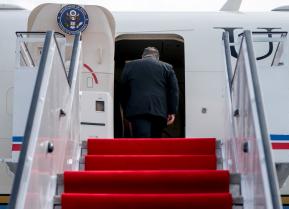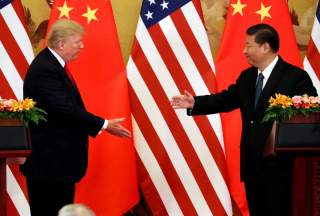America and China: Destined for Conflict or Cooperation? We Asked 14 of the World's Most Renowned Experts
The National Interest asked 13 scholars and experts to respond to the following question: Given growing tensions between the United States and China, where do you see the overall relationship headed? Towards a permanent state of competition?
The Future:
This is not a story which appears likely to end with all the parties living happily ever after. The key variable will be China’s economic growth rate. If China can continue to grow annually at 6 percent or more, the attractions of its market and its aid will make it harder and harder to get its neighbors to resist Beijing’s blandishments. If China’s growth rate slows, however, that will provide more opportunities for the U.S., Japan, and India.
China is not currently capable of directly challenging the U.S. militarily, so we are likely to face a situation of long-term competition, not war. If the U.S. can deal with its budget and trade deficits and avoid getting involved in unnecessary wars, U.S.-China relations will be tense but manageable. If the U.S. mishandles its economy or appears to be withdrawing from Asia, then Beijing is likely to test American commitments and conflict is much more probable.
Check out other comments in this series from: Graham Allison, Gordon G. Chang, David Denoon, Michael Fabey, John Glaser, James Holmes, Lin Gang, Kishore Mahbubani, Robert Ross, Ruan Zongze, Robert Sutter, Xie Tao, Xu Feibiao and Wang Jisi.
Michael Fabey, Military reporter and author of Crashback: The Power Clash Between the US and China in the Pacific:
Barring any major course change in U.S. or Chinese foreign policy, the two countries’ military forces, especially their naval forces, are fated to continue to clash in the Western Pacific.
The two countries have two diametrically opposed core beliefs that guide their military maneuvers in the region. The U.S. believes most of the airspace and sea lanes are internationally open regions for the benefit of any nation. China, however, lays claim to all that as Chinese territory and feels the rest of the world should acknowledge that as fact.
The U.S., through various patrols, bases and partnerships, has managed to police the sea and air lanes for more than seven decades. While some Americans may complain about the cost of being the ‘world’s cop,’ the biggest beneficiaries during this time have been the U.S. consumers and businesses. To thrive, the U.S, must maintain the free flow of commerce from, to and through the Indo-Asian-Pacific.
China claims ownership of the Western Pacific territories based on the nations regional dominance from centuries past. Chinese leaders feel they lost control of the area due to ‘unequal’ and ‘unfair’ treaties imposed on them by Western powers and China wants to right those wrongs so that it can once again be the true ‘middle kingdom’ — or, to put it another way, ‘the center of everything.’
The budding bromance between U.S. President Donald Trump and Chinese President Xi Jinping aside, there’s every indication the two countries’ military positions in the Western Pacific are hardening.
For example, in the beginning of this year, the Pentagon released its new National Defense Strategy, in which, for the first time, the U.S. officially identified China, along with Russia, Iran and North Korea, as adversaries and threats. Since then, the U.S. Navy has continued with publicized freedom-of-navigation patrols in the region, exercised with allies and deployed new advanced weaponry in the Western Pacific that has increased tensions with Chinese military leaders. U.S. naval leaders embarrassed China by disinviting its forces from the annual Rim of Pacific (RIMPAC) exercise off the coast of Hawaii in July.
The reason for the RIMPAC blackballing was Chinese militarization of bases it built on artificially created or augmented island features in the South China Sea, reneging on a promise President Xi had made against doing so just a couple of years ago. Xi has also started sending warships on patrols all throughout the region, building more aircraft carriers and warning U.S. military and political leaders he will cede none of China’s claimed territory – even though that territory also happens to be land, water and air claimed by other Asian nations, including U.S. allies and partners. China wants the South China Sea to be its Caribbean. As the U.S. controls the Americas, China wants to control Asia. And with Xi being named president for life, there’s no reason to believe China will retreat from its position.
Check out other comments in this series from: Graham Allison, Gordon G. Chang, David Denoon, Michael Fabey, John Glaser, James Holmes, Lin Gang, Kishore Mahbubani, Robert Ross, Ruan Zongze, Robert Sutter, Xie Tao, Xu Feibiao and Wang Jisi.
John Glaser, Director of foreign policy studies at the Cato Institute:
The future of the Sino-American relationship is deeply uncertain.
Though the United States will remain at the top of the international hierarchy for the foreseeable future, it is undoubtedly experiencing relative decline, while China is indisputably on the rise. The two titans of the 21st century maintain an uneasy rapport, conscious of each other’s power, suspicious of each other’s intentions, and covetous of the stature that accompanies global supremacy.
In its approach to China over the past few decades, U.S. leadership has oscillated between dismissive arrogance, sincere cooperation and brazen competition.
Tragic foul-ups, like the Clinton administration’s accidental bombing of the Chinese embassy in Belgrade and the in-air collision of a U.S. spy plane with a Chinese fighter jet early in the Bush administration, are seen in Beijing as the hubristic blunders of an intemperate bully. More deliberate taunts continue to this day, exemplified by the Obama administration’s pointless opposition to innocuous Chinese initiatives like the Asian Infrastructure Investment Bank, overwrought anxiety toward the Belt and Road Initiative and President Trump’s imperious trade war ultimatums.
Yet, on crucial diplomatic and security efforts, from the Six Party Talks and the Paris climate accord to post-9/11 counterterrorism cooperation and the Iran nuclear deal, the United States capitalized on overlapping interests while respecting China’s position as a vital global player. Though less than perfect, the bilateral economic relationship has been immensely beneficial to both sides.
However, the U.S. approach at times appears to resemble outright containment. The cutthroat geopolitical undertones of the so-called Pivot to Asia were lost on no one. Washington’s attempts to counter Beijing’s claims in the South China Sea have, if anything, hardened China’s posture. And the Trump administration’s blunt confrontational approach seems to have provoked even greater distrust across the Pacific.
Rising powers must be managed carefully. China’s growing strength will surely translate into a more ambitious foreign policy, but how we deal with it is up to us.
So far, China shows no inclination toward aggressive territorial conquest. Nor is it clear that a Chinese-led order would differ much on the essentials than the U.S.-led order. Indeed, China’s rise is more a threat to America’s status as the indispensable nation than any tangible threat to national security.
Many great powers throughout history have let fixations about national prestige thrust them into destructive wars. If the Sino-American relationship is to remain peaceful, we must learn to forfeit such superficial pretensions and focus on narrow, concrete security and economic interests. Failure to do so may lock us into a costly cold war that neither country can win.
Check out other comments in this series from: Graham Allison, Gordon G. Chang, David Denoon, Michael Fabey, John Glaser, James Holmes, Lin Gang, Kishore Mahbubani, Robert Ross, Ruan Zongze, Robert Sutter, Xie Tao, Xu Feibiao and Wang Jisi.
James Holmes, J. C. Wylie Chair of Maritime Strategy at the Naval War College and author of Chinese Naval Strategy in the 21st Century: The Turn to Mahan:
Not too long ago we used to talking about ‘managing’ the rise of China, as though it's in an established great power's gift to manage what an aspiring great power does. China has risen, and is a great power in its own right.
China's leadership vows to make China into a ‘maritime power.’ It is a maritime power of note, and has been for some time. It has the power to attempt to make good on what President Xi Jinping calls its ‘Chinese Dream’ of national rejuvenation following what Xi, the Chinese Communist Party, and rank-and-file Chinese citizens regard as a long century of disgrace at the hands of foreign seaborne conquerors, dating all the way back to the Opium Wars starting in 1839. China's rise, and its evident desire to modify the liberal system of maritime trade and commerce over which the United States has presided since 1945, has set an interactive competition in motion. China wants to amend the system; the U.S. wants to preserve it.
Which brings about this question: how much flex is there in either side's policies and strategies? I see little on Beijing's side. You have to hand it to China's leadership. This is a very open closed society, and has put the world on notice time and again about its aims. The party leadership has also gone on record repeatedly promising to deliver certain goals such as a union with Taiwan. As any negotiations specialist will tell you, a public promise like that represents one of the strongest commitments any leader can make. Fail to follow through and you paint yourself as weak and ineffectual. Your constituents will hold you accountable for failing to keep your promise -- perhaps in gruesome ways.


